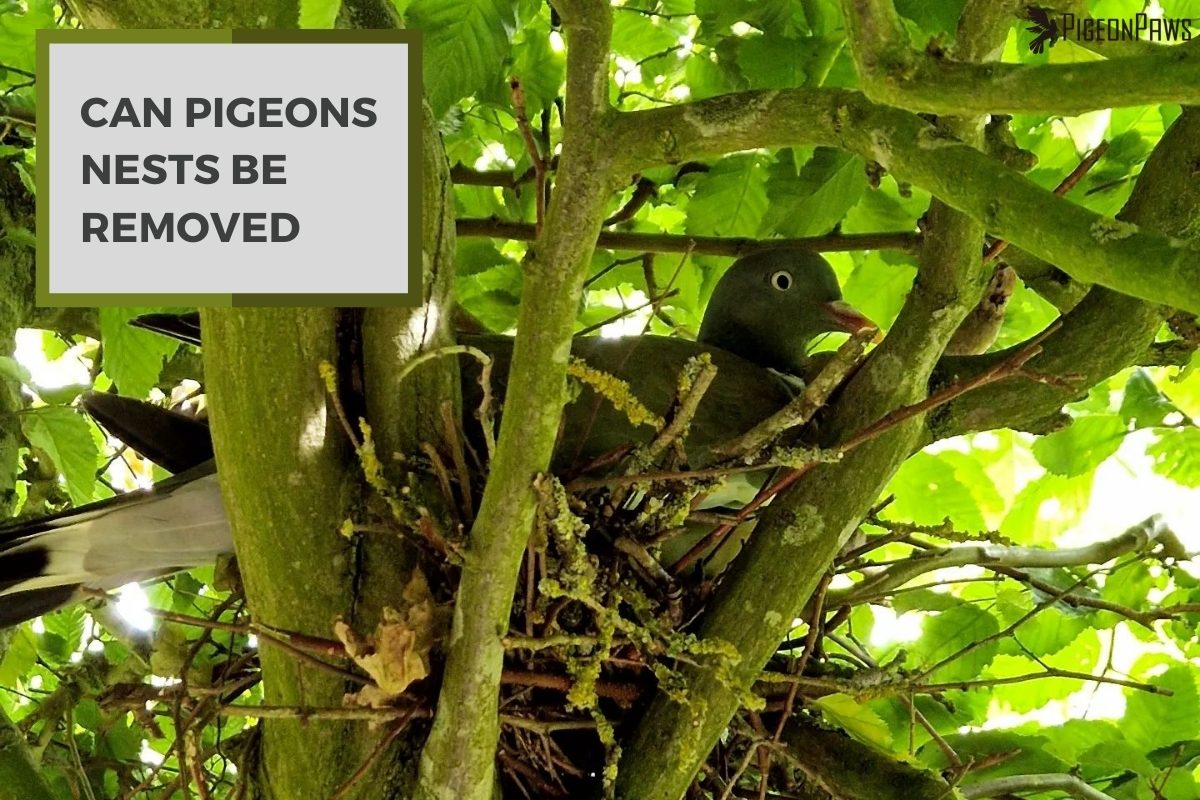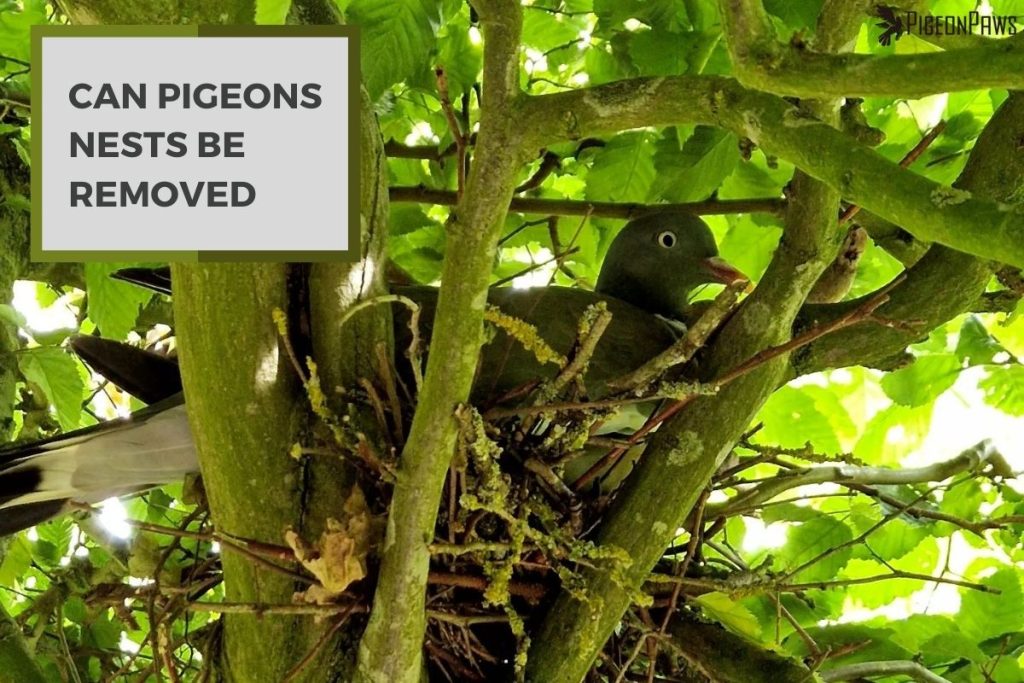Can Pigeons Nests Be Removed? Best Practices and Options

Are you weary of pigeons entering your property and causing havoc? Their nests can attract other pests and illnesses, making them a nuisance and a health threat. So, what are your options?
Pigeon nests may be removed, which is excellent news. A mixture of procedures, such as vacuuming the eggs and physically dismantling the nest, or the use of specialist equipment, may be used. However, doing so carefully and effectively is critical to prevent legal difficulties and injury to the birds.
In this interesting article, I’ll go through the legalities around nest removal, the best ways for doing so, and how you may prevent pigeons from establishing nests on your property in the future.

What Are The Reasons for Removing Pigeons Nests?
When pigeons decide to build their nests in inappropriate places, they can cause a slew of issues. People may seek to destroy pigeon nests for a variety of reasons, ranging from practical to aesthetic. The following are some of the most prevalent causes for removing pigeon nests:
Health Concerns
Pigeons have been shown to transmit a variety of illnesses and parasites that can affect humans and pets. Their feces can also cause respiratory issues and allergies.
Property Damage
Pigeons can cause significant damage to buildings and structures by pecking at roofs and walls, chewing on electrical wiring, and soiling surfaces with their droppings.
Hygiene Issues
Pigeons are dirty birds, and their nests can attract pests like flies, mosquitoes, and mice. Droppings, feathers, and other waste may accumulate and create an unhygienic and unpleasant atmosphere.
Aesthetic Reasons
Pigeon nests may be unattractive and detract from a building’s or property’s look. They can also interfere with the correct operation of air conditioning units or other mechanical systems in rare situations.
It is vital to realize that eliminating pigeon nests is more complicated than just removing the birds. In some circumstances, rules and regulations must be observed while eliminating nests, and it may be essential to hire a professional pest control firm to do the task safely and properly.
Legal Considerations for Removing Pigeons Nests
Pigeon nest removal can be a complicated issue due to the many rules and regulations that regulate the management of wild and domestic pigeons. Depending on where you live and the circumstances, there may be municipal, state, or federal regulations that govern what you can and cannot do with pigeons and their nests.
Protection of Wild Pigeons
Many pigeon species are protected by federal and state regulations, including the Migratory Bird Treaty Act. This regulation prohibits harming, capturing, or killing pigeons, as well as disturbing their nests and eggs. Violations of these regulations can result in large penalties and possibly jail time.
Domestic Pigeons
The regulations governing nuisance animals and the disposal of property must be taken into account even if domestic pigeons are not legally protected.
Domestic pigeons may occasionally be deemed a nuisance and need to be removed by animal control, but only after adhering to the correct procedures and acquiring the required permissions.
Balancing Human And Environmental Interests
It’s critical to strike a balance between the requirements of humans and the preservation of the environment while eliminating pigeon nests. For instance, it could be required to remove a pigeon nest from a structure for health and safety concerns, but it must be done without harming the pigeons or their eggs.
How to Determine If A Pigeon’s Nest Is Active Or Inactive?
The level of activity in a pigeon’s nest will determine whether it has to be removed or not. An active nest can contain eggs or baby pigeons, and removing such a nest is illegal and can result in penalties. Here are some steps to determine the activity of a pigeons nest:
- Observe the birds: Observing the pigeons regularly can help you determine if a nest is active or not. If you see pigeons frequently entering and leaving the nest, then it is most likely an active nest.
- Check the eggs: Look for eggs inside if you can safely access the nest. Fresh eggs will have a shiny appearance and will feel warm to the touch.
- Look for young birds: It is an active nest if you see baby pigeons in the nest.
- Consult with wildlife experts: If you are unsure, consult with a local wildlife expert for their opinion. They will have experience in determining the activity of pigeon nests and can provide you with the necessary information.
How to Remove Pigeons Nests Safely And Effectively?
I’m sure many of you have had the same issue as I have: having obnoxious pigeons move inside your house. Although it isn’t enjoyable, handling the problem safely and effectively is also necessary. I’ll now demonstrate to you the finest method for securely and successfully removing pigeon nests. Let’s get going.
Safety Measures for Removing Pigeons Nests
Removing pigeon nests can be dangerous, especially if there are eggs or baby pigeons inside. To keep both you and the pigeons safe, it’s crucial to take the appropriate precautions.
To avoid becoming sick from pigeon droppings, which might contain illnesses, wear gloves, long sleeves, and trousers. Use a ladder or other sturdy platform to reach high nests, and always have someone hold the ladder steady.
Techniques for Removing Pigeons Nests
The most efficient method for eliminating pigeon nests will vary depending on the size, location, and type of nest. Simply remove any little nests by hand and properly dispose of them.
For larger nests, use a pole or long tool to remove the nest. You can also use bird netting to cover the nest and discourage the pigeons from returning. Be sure to remove the netting and any debris once the nest is gone.
Prevention And Deterrents
Preventing pigeons from constructing their nests in the first place is the best approach to get rid of them. On ledges, windowsills, and other places where pigeons like to make their nests, place bird spikes or bird netting.
Pigeons can be scared away by using decoys like hawks or owls. These techniques are kind to the birds and won’t hurt them. You may lessen the need for pigeon removal by implementing preventative actions that prevent pigeons from ever constructing nests.
Should You Get Rid of The Pigeon Nest?
Conclusion
It’s important to comprehend the legal implications and the appropriate removal techniques since taking down pigeon nests may be a difficult undertaking. It’s important to deal with pigeons in a safe and compassionate way since they may be an annoyance and provide health and safety issues.
Determining whether the nest is active or dormant and removing it safely and successfully are essential whether you are working with domestic or wild pigeons. With the knowledge provided in this article, handling pigeon nest removal in your region will be easier for you.

